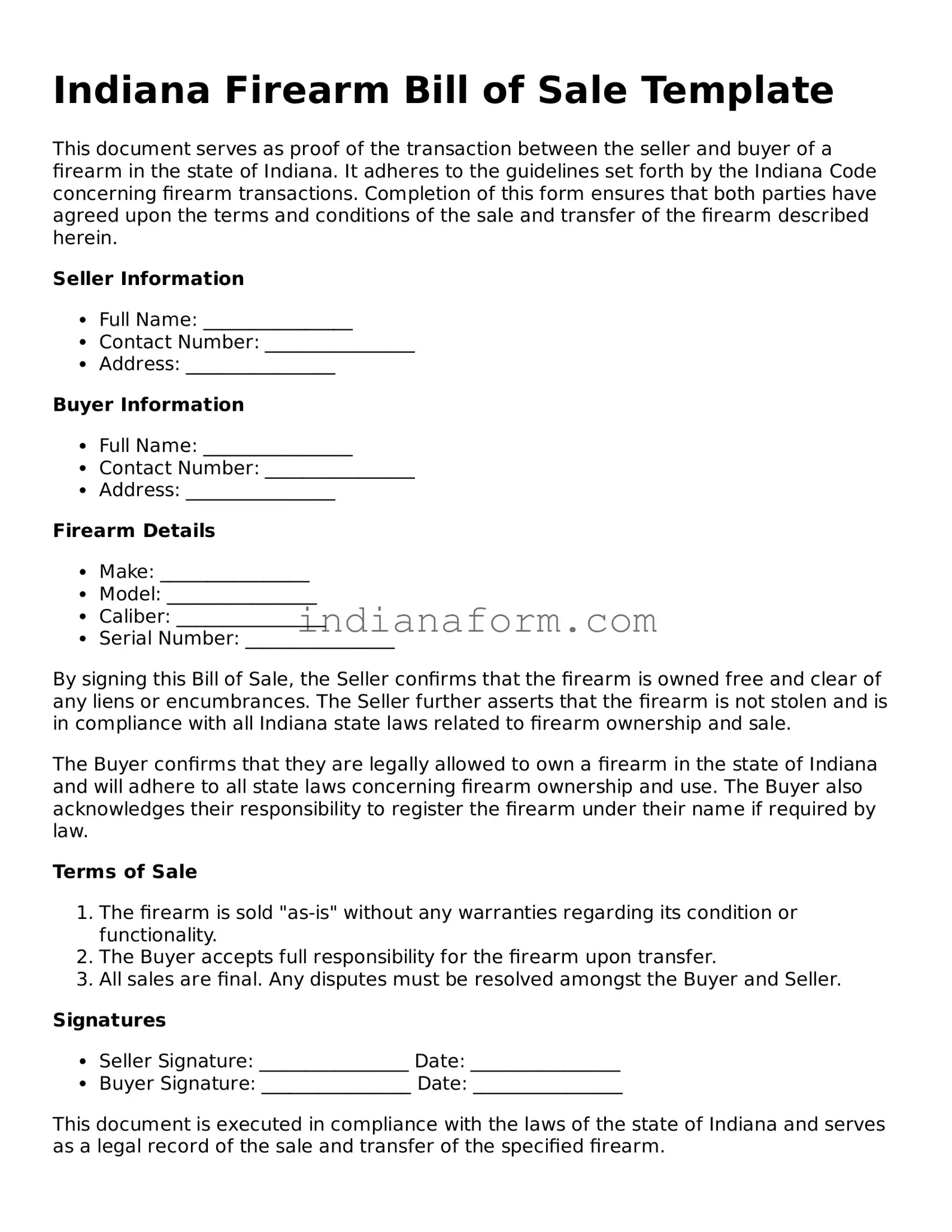What is an Indiana Firearm Bill of Sale?
An Indiana Firearm Bill of Sale is a legal document that acts as proof of the sale and purchase of a firearm within the state of Indiana. It records details about the transaction, including information on the buyer, seller, and the firearm itself. This document serves to verify the change of ownership and can be an important piece of record for both personal and legal purposes.
Is an Indiana Firearm Bill of Sale required by law?
In Indiana, there is no specific legal requirement that mandates the use of a firearm bill of sale when transferring ownership of a gun. However, it is highly advisable to use one as it provides a written record of the transaction, which can be invaluable for future reference or if any legal issues arise concerning the firearm.
What details should be included in an Indiana Firearm Bill of Sale?
A well-completed Indiana Firearm Bill of Sale should include the full names and addresses of both the buyer and the seller, a detailed description of the firearm (including make, model, caliber, and serial number), the sale date, the sale price, and statements regarding the legal ability of the buyer to purchase a firearm. It's also recommended to have both parties sign the document, possibly in the presence of a notary public.
Do I need to notarize an Indiana Firearm Bill of Sale?
While notarization of a Firearm Bill of Sale in Indiana is not a legal requirement, having the document notarized can add a level of legal authenticity and may help protect both parties in case of future disputes. This step ensures that the signatures on the document are verified, adding an extra layer of security to the transfer process.
Can I create my own Firearm Bill of Sale for use in Indiana?
Yes, you can create your own Firearm Bill of Sale for use in Indiana. It is crucial, however, to ensure that the document contains all necessary information to accurately reflect the transaction and the parties involved. You may find templates online or consult with a legal professional to draft a document that fulfills all requirements for your specific situation.
How does a Firearm Bill of Sale protect the buyer?
A Firearm Bill of Sale protects the buyer by providing documented evidence of the firearm's purchase and transfer of ownership to the buyer. This documentation can be crucial if there are any future legal questions concerning the firearm's ownership, its history, or if the buyer needs to prove lawful possession.
How does a Firearm Bill of Sale protect the seller?
For the seller, a Firearm Bill of Sale acts as a record that they have legally transferred the ownership of the firearm to the buyer, releasing them from liability associated with the firearm's future use. It provides tangible proof that the seller followed the right process in the sale, potentially protecting them in case of legal complications.
What happens if I lose my Indiana Firearm Bill of Sale?
Should you lose your Indiana Firearm Bill of Sale, it's advisable to attempt to recreate the document as accurately as possible with the other party if they are willing and available. For added protection, consider keeping digital or scanned copies of the original document to prevent issues stemming from loss or damage to the physical copy.
Can a Firearm Bill of Sale be used for registering a firearm in Indiana?
In Indiana, firearms do not need to be registered with the state. Therefore, a Firearm Bill of Sale would not be used for registration purposes. However, it remains an important document for personal records, providing detailed proof of the transaction and ownership should it ever be required for legal reasons or personal verification.

